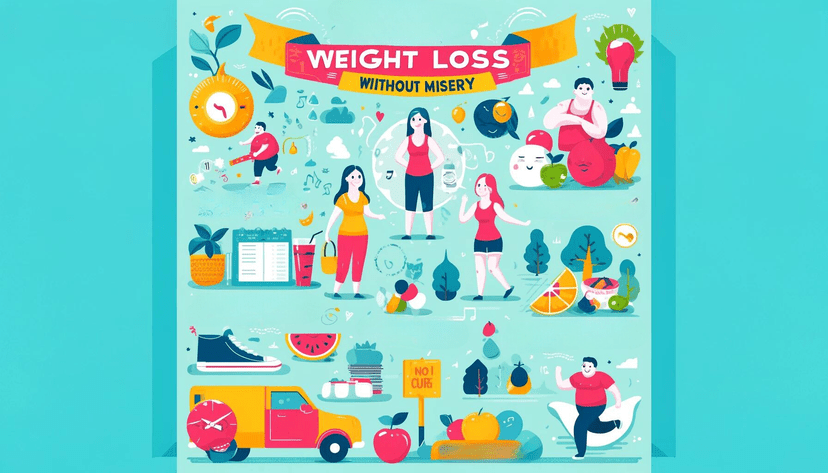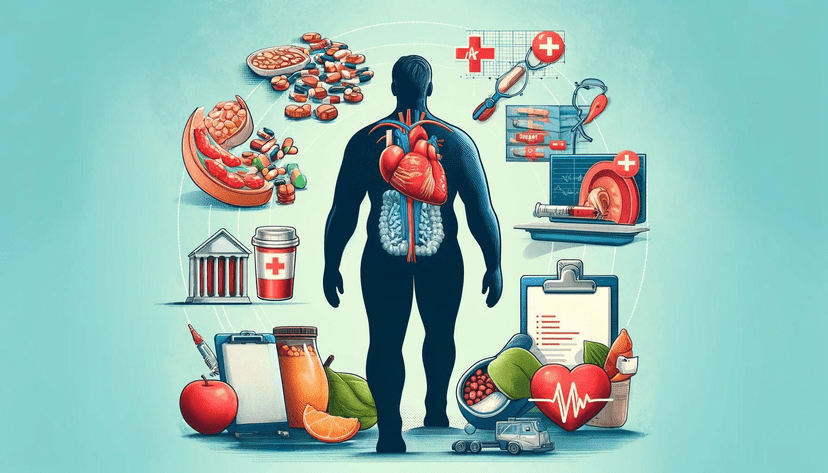How to Manage Stress from Weight Loss without Comparing to Your Younger Self

Understanding the Stress of Weight Loss
When embarking on a weight loss journey, it's common to feel a cascade of emotions, ranging from determination to anxiety. One serious and yet often overlooked aspect of such undertakings is the stress related to weight loss efforts. This stress is not purely physical; it's psychological and emotional. The driving force behind this stress is typically unrealistic expectations and irrational comparisons to one's past self, often in their prime youth, when weight management may have been seemingly effortless.
Previously accumulated pictures or memories of a thinner or fitter self can create unrealistic benchmarks for current weight loss efforts, fuelling disappointment when these are not met leading to amplified stress. Moreover, constantly comparing oneself to a younger self is a skewed perspective as it often disregards the natural biological and physiological changes that accompany age. This incessant comparison not only casts a shadow on our current abilities but can also undermine any progress made, leading to discouragement, self-doubt, and worse, ruminations of self-defeat.
Identifying Sources of Stress in Weight Loss Journeys
Identifying the sources of stress in your weight loss journey is the first critical step in managing it effectively. Typical stress triggers can include:
- Unrealistic Expectations: Expecting too much in too little time can lead to frequent disappointments, fuelling stress.
- Extreme Dietary Restrictions: Strict dieting often leads to cravings and feelings of deprivation, which causes anxiety.
- Fear of Failure: Past unsuccessful weight loss attempts can instill fear of failure, causing undue stress.
- Body Image Issues: Perceived flaws in one's body can result in negative self-view, leading to stress.
The Impact of Comparing to Your Younger Self
Even though looking back at past achievements can sometimes motivate and give hope, when it comes to weight loss, comparing to one’s younger self can often lead to frustration. This counterproductive comparison erodes self-esteem, engenders feelings of inadequacy, and creates mental stress that can adversely affect your physiological stress responses, hormone balance, and in turn, weight loss progress.
As we age our metabolism slows, our body composition changes, and our exercise capacity alters. Hence, comparing our current weight loss rate with the past disregards these essential aspects. It's as unproductive as comparing an apple to an orange.
Shifting Focus from Comparison to Self-Compassion
Transitioning from a comparison mindset to one of self-compassion is critical in handling weight loss-related stress. Be gentle with yourself, remember everyone progresses at their individual pace, and every step, no matter how small, is still a step forward. Respect your body's changing capabilities and needs. When you learn to appreciate your body for its resilience and extraordinary functionality, you gradually shift focus from constantly measuring up to previous standards and start focusing on currently feasible goals.
Self-compassion in your weight loss journey involves:
- Recognizing your efforts instead of only the outcomes.
- Embracing self-love despite the fluctuation in weight.
- Believing in your body's abilities and strengths.
- Reminding yourself that it's a slow and mindful journey, not a race.
So embrace each step, and gradually transform your weight loss journey from a stress-laden undertaking to a sustainable, health-focused change.
Strategies for Stress Management and Self-Acceptance
It's exceedingly common for individuals embarking on a weight-loss journey to succumb to the stresses associated with perceived societal pressures and self-imposed expectations. The process often involves a continuum of altering lifestyle habits, adjusting dietary routines, initiating workout regimes and much more. As such, the mental health aspect emerges as an integral element of this journey, which brings us to the importance of stress management and self-acceptance in the context.
Recognizing and addressing your emotional wellbeing is fundamental to maintaining motivation, fueling consistency, and enhancing overall satisfaction with the weight loss process. This segment will detail actionable strategies that can assist you in managing stress related to weight loss and fostering self-acceptance.
Practicing Mindfulness and Present Moment Awareness
Mindfulness, at its core, is about tuning into the present moment, guided by an open-minded, non-judgmental awareness of one's feelings, thoughts, and physical sensations. This practice, when incorporated into daily routines, can offer a significantly positive impact on stress levels.
To get started with mindful practices:
- Stipulate a set time each day for sitting quietly, focusing on your breathe, and grounding yourself in the present moment. This exercise helps in gradually incorporating mindfulness into your daily life.
- While eating, practice mindful eating. Take the time to savor each bite, pay attention to the taste, texture, and aroma of the food. This can help in better understanding your body’s hunger and satiety signals, supporting weight loss, and making the eating process more enjoyable.
- Keep in mind, it's a practice rather than an immediate solution. Cultivate patience and keep bringing your focus back to the present moment, gently and without criticism.
Setting and Appreciating Realistic Goals
An essential factor in stress management is to set and appreciate realistic goals. Setting highly ambitious, unrealistic goals can lead to intense pressure, disappointment and ultimately, higher stress levels.
To set realistic weight-loss goals, consider:
- Identifying what is achievable in the short-term. Track these small goals and celebrate your progress to keep motivation high.
- Relying on health-related goals over purely aesthetic ones. This approach steers your focus towards holistic wellbeing, translating into both mental and physical health improvements.
Remember, each person's weight loss journey is unique, and comparisons only breed unnecessary stress. Applaud all victories, no matter how small, and appreciate your journey with kindness and patience.
The Role of Self-Care in Reducing Stress
While weight loss involves substantial lifestyle changes, including diet and exercise, not enough emphasis is placed on the importance of self-care. Beyond serving as a stress-coping mechanism, self-care is a crucial determinant of your overall well-being and happiness levels.
Your self-care strategy might involve:
- Regular sleep hygiene. Good sleep is correlated with an array of health benefits, from improved cognitive function to stress reduction and even weight management.
- Find activities you enjoy to incorporate into your routine, whether it's a long walk, reading, or cooking a healthy meal.
- Prioritizing time for relaxation and personal downtime.
By treating yourself with kindness, understanding your limits, and nurturing your wellbeing, you'll set a sturdy foundation for a successful weight loss journey that is both enjoyable and rewarding in the long term.
Navigating through the ups and downs of weight loss, managing stress, and fostering self-acceptance may appear daunting. Still, with mindful practices, realistic goals, and consistent self-care, you are equipping yourself with the essential tools to make the journey more empowering. Remember, it's not a race, but a lifelong process that operates within the principle of continual improvement.
Building a Supportive Environment for Weight Loss
Building an environment that is conducive to weight loss is essential. It's not only about physical transformations but also the emotional challenges that accompany them. Reducing stress during this journey becomes crucial, and one of the key elements in this stress management process is creating a supportive environment.
Leveraging Social Support for Emotional Well-being
One of the first steps towards creating this environment is through social support. Cultivating a network of people who can empathize with your journey and provide nonjudgmental support. This could be friends or family members who have experienced similar challenges, or even those who simply understand the journey you are on and are there to cheer you on.
Studies show that having a strong social network can significantly reduce stress and improve general well-being. An Oxford University study found that people with more social connections have lower levels of stress hormones. In the context of weight loss, this can also help with staying committed to good nutrition and regular exercise, essential elements in sustainable weight management.
The Benefits of Professional Guidance in Weight Loss
While having a supportive social network is important, professional guidance should not be underestimated. Engaging professionals like therapists or nutritionists can bring objective insights into your weight loss journey.
Nutritionists can offer expert advice on food choices, portion control, and meal planning. They can help you navigate the complex world of nutrition, providing advice and guidance that is scientifically sound and tailored to your specific needs. This takes away the guesswork and stress often associated with dieting and weight loss.
Therapists, especially those who specialize in cognitive behavioural therapy (CBT), can help manage both stress and self-perception. They can assist you in changing the way you think about food, weight, and body image, while providing usable strategies for managing stress and anxiety. A review published by the Harvard Medical School indicates that CBT is one of the most effective treatments for stress, anxiety, and depression.
Creating a Non-Judgmental Support Network
Another crucial element in managing stress while losing weight is fostering a non-judgmental support network. This might include people who are also working on weight loss and understand firsthand the challenges that come with it.
Online weight loss support groups, forums, or social media groups can offer opportunities to connect with others on a similar journey. The members of these groups often share their experiences, challenges, and victories, creating an empowering environment of mutual support and understanding.
Remember, it's not a competition, and each person's journey is unique. The goal is not to compare your current self with your past self, or anyone else, but to improve and grow healthily at your own pace. The journey towards weight loss, like any other journey, should be about self-improvement and self-care. Be gentle, supportive, and patient with yourself, and find others who will do the same.
In Summary
To effectively manage the stress associated with weight loss, it's essential to recognize that this stress often stems from unrealistic expectations, extreme dietary restrictions, fear of failure, and body image issues. Equally, comparing oneself to one's younger self can result in discouragement, feelings of inadequacy, and self-defeat.
It is crucial to shift focus from comparison to self-compassion, concentrating on currently feasible goals. Self-compassion involves appreciating your efforts, maintaining self-love despite weight fluctuations, believing in your body's abilities, and recognizing weight loss as a slow and mindful journey.
In terms of stress management, strategies include practicing mindfulness, setting and appreciating realistic goals, and incorporating self-care. Reducing stress also involves creating a supportive environment that leverages social support and professional guidance.
The process of managing stress and encouraging self-acceptance in your weight loss journey is a long-term commitment. It requires gradual changes and consistent efforts on your part. Below are some action steps to help you start.
Action Steps
- Identify the sources of stress: Recognize the triggers in your weight loss journey, whether they are unrealistic expectations, dietary restrictions, fear of failure, or body image issues.
- Adopt self-compassion: Shift focus from constant comparison to self-compassion. Recognize your efforts and maintain self-love amidst all ups and downs in your weight loss journey.
- Practice mindfulness: Make time each day to practice mindfulness, start with simple steps like focusing on your breathing or practicing mindful eating.
- Set realistic goals: Reframe your ambitions. Make them realistic and achievable in the short term. Congratulate yourself every time you accomplish one.
- Incorporate self-care: Beyond diet and exercise, remember to sleep well, engage in activities you enjoy, and prioritize time for relaxation and personal downtime.
- Build a supportive environment: Surround yourself with supportive friends and family, seek professional guidance, and consider joining online weight loss or wellness groups.
Remember, the journey towards weight loss and improved health is personal and unique to every individual. Embrace the process, celebrate your progress and learn from setbacks. It's not about perfection, but continuous growth and sustained self-improvement.





